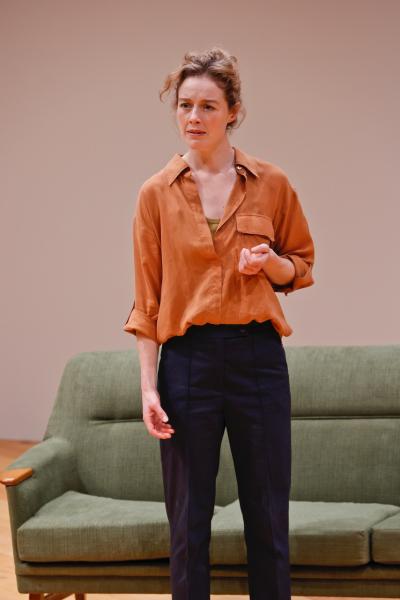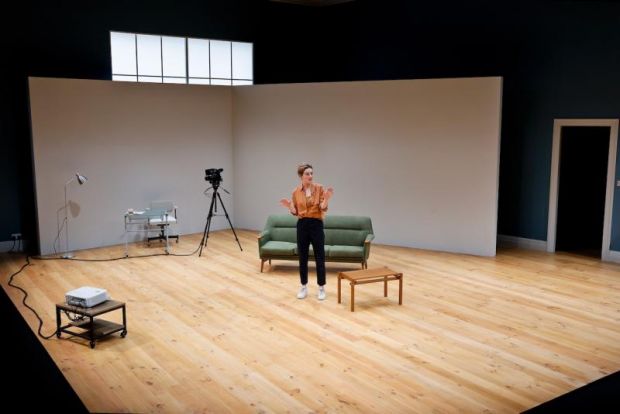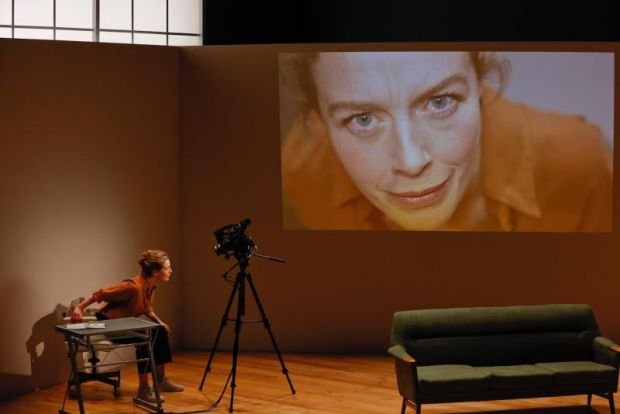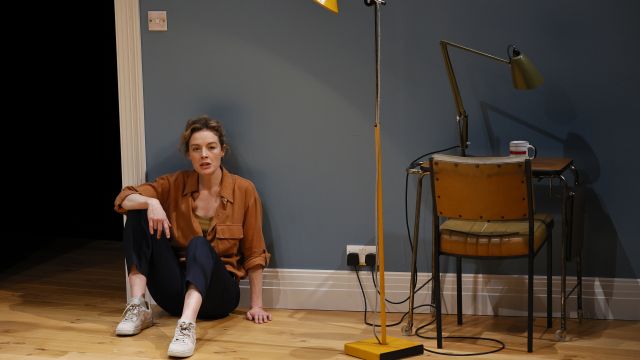Girls & Boys
Nikki Shiels alone commands the stage for close to an hour and fifty minutes. Known in the text only as ‘Woman’, she’s winning, she’s attractive, she’s funny. She meets the challenge of holding the audience over that length of time with well-judged changes of rhythm, of tone and attack. Under Kate Champion’s direction, she travels around Marg Horwell’s sparse utilitarian set with what looks like confidence, but her moves are in sync with the story she tells us, and we start to realise she is keeping herself in control.
Time transitions are smoothly suggested by Amelia Lever-Davidson’s lighting. When the story moves on to Woman being a mother of two, Shiels mimes the two kids - nicely reminding the audience of the theatricality of all this when she stops and tells us directly, ‘I do know they’re not here.’
Her story is that of a feckless girl who travels and meets her husband in a very rom-com way, and they have a great marriage, and two kids, and she becomes a successful documentary film producer - rather too successful as it turns out…
Thinking about Girls & Boys afterwards, I was reminded of something that, by chance, I had read recently: a review by Daniel Soar in the London Review of Books of Ian McEwan’s new novel Lessons. In McEwan’s novels and short stories, Soar argues, ‘Derangement, violence, the startling irruption of danger or threat into what would otherwise be an unruffled life; in one form or another, the unpredicted terrible instant that changes everything is what makes McEwan tick… [It is] the shock attack - against normality, security, sanity.’ The unexpected event is, if not the sine qua non, the engine that drives McEwan’s narratives.

That is, in its way, what happens in Girls & Boys - ‘an irruption… into… a life’ - not an unruffled life and not all that sudden because there is a build, one incident after another, to what happens, but what happens is the play’s raison d’être - indeed its climax; what happens is something horrific, told in cold, graphic detail - and, it is not totally unexpected either because, as the show’s blurb says, it is ‘all too common.’
Without the violence there might be no reason to tell this story beyond that of a marriage that turns sour as a husband fails as a wife succeeds, and the balance of control is upset.
The narrator, Woman, prepares the audience before she begins her final account: ‘This is the hard bit. This is the bit that’s been coming, and I think maybe you’ve known it’s been coming. But… this did not happen to you and… it is not happening now.’ Again, the theatricality, the emphasis on the attempt to understand.
We are also warned by a sign, on our way into the theatre, that the play contains ‘descriptions of graphic violence and suicide’ - so, yes, we know to expect something. But it is the story of the life that precedes the violence perhaps the problem. Considering where it ends up, is there too much of that life? Taking absolutely nothing away from Nikki Shiels’ marvellous performance, nor indeed from Kelly’s creation of the character with its humour, self-deprecation, sometimes shocking honesty, and the skilful and convincing mix of thoughtful reflection and potty mouth talk, this character is, for me, strikingly normal. Or do I mean simply ‘recognisable’? And is that maybe exactly the point? As in, ‘this could - and does - happen to anybody.’

Yes, Woman tells some great anecdotes - like meeting her husband for the first time at Naples airport in an easyJet queue, or her crash-through-or-crash job interview (that makes us like and admire her) - but one’s first impression is nevertheless close to ‘likeable but shallow girl trying hard to impress’.
She becomes a successful film producer, but we don’t hear much about how or why. Yes, she becomes a mother of two - and Shiels, alone on stage, brilliantly creates the pains and pleasures of bringing them up (and mostly alone, it seems?). But it is, unfortunately, all rather drawn out, predictable and just that bit banal, and I found myself waiting for something to happen. That violence we are warned about perhaps. And thus, we are in a way complicit; it’s a kind of Hitchcockian moral trap.
It’s also interesting to compare Girls & Boys with two other quite recent and timely female monologue plays that are cries of outrage: Suzie Miller’s Prima Facie and Gary Owen’s Iphigenia in Splott. In Miller’s play, the narrator is a somewhat repellent monster, a cocky, boastful barrister who tumbles into catastrophe when she becomes the victim of the very violence she minimises and brings into doubt, and the very system from which she draws her triumphs and her living.
Iphigenia’s narrator is by contrast the girl you’d avoid in the street: drunk, druggie, slag, layabout - and yet who by the play’s end asserts her value as a human being and has you caring deeply about her and outraged at the state for its treatment of her. And she just tells her story without any need to hammer it home with some explicit spelling out of the message - as we get in Prima Facie and Girls & Boys.

Here, the title suggests a behavioural psychological difference between girls and boys. Woman’s daughter is creative, her son destructive. Where does male violence come from? The play makes us speculate: is it failure, shattered pride, shattered ego, jealousy, loss of control, loss of power, loss of entitlement? I wonder if we might have speculated more and more usefully had the play begun with the violence.
Do we, despite the stunned silence and scattered gasps from the audience at the end, really care? Clearly the audience, or the bulk of it, do care and productions of this play elsewhere have been hugely successful despite what seems to me a flawed text.
Shiels provides a bravura performance that earned her a standing ovation on opening night. But that standing ovation was, I’m sure, more in admiration for that long, superb, amazing sustained performance rather than for the story that that performance told.
Michael Brindley
Photographer: Jeff Busby
Subscribe to our E-Newsletter, buy our latest print edition or find a Performing Arts book at Book Nook.

